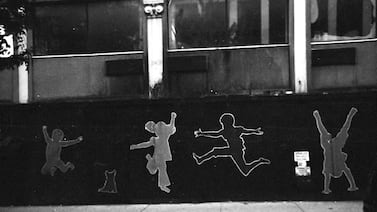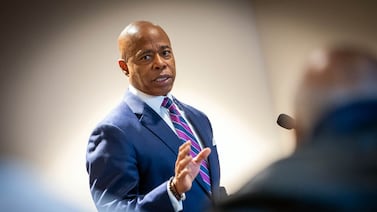School funding, early childhood education, and teacher training are expected to be key education issues during the Illinois General Assembly’s spring session.
The session is already off to a rocky start, as a COVID surge in early January led to days being canceled and legislators working remotely. Legislators will be working to pass new bills and approve the state’s budget before the session ends in April.
Here are six education-related issues Chalkbeat Chicago will be watching this session:
K-12 education funding
As Illinois manages an economic crisis due to the pandemic, adding money to the evidence-based funding formula for K-12 public schools has been an uphill battle. The goal of the formula is to correct for years of funding inequity between wealthy districts and resource-strapped ones, but meeting that goal requires additional contributions each year.
Gov. J.B Pritzker kept the funding formula flat during the first year of the pandemic to ensure that there would be no cuts to education funding, but it also meant no new dollars added to the formula. Last year, the governor proposed a second year of flat funding but reversed course during the spring legislative session and put $350 million into the formula, which was later approved by the general assembly.
In December, the state board of education proposed a budget increase of $475 million with $350 million going towards the funding formula, upholding a bipartisan promise legislators made in 2017. The state has received over $7 billion in federal emergency funding, but advocates say state dollars are vital to investing in staffing and keeping positions filled over time.
Advance Illinois’ senior policy advisor, Melissa Figueira, is hoping the state continues to put $350 million towards the formula but hopes for more.
An analysis released in December by the state board of education’s Professional Review Panel estimated that it would take until 2042 to fully fund schools if the state continues to invest $350 million — considered the base amount. When the formula was created in 2017, the goal was to fully fund the state’s 852 school districts by 2027.
According to Figueira, if the state wanted to fund schools by 2032, it would take $527 million a year.
Recovering from COVID-19
Over the last couple of years, as the state has grappled with the pandemic, Illinois students have experienced school closures starting in March 2020, hybrid learning during the 2020-2021 school year, and some closures in the current school year amid a surge in COVID cases.
There’s no recipe for how districts are supposed to address the academic and emotional fallout of the pandemic, but some policymakers are pushing for additional instructional time.
In this session, Rep. La Shawn Ford (D-Chicago) will propose that school districts extend this school year into the summer to help recover academic gains. He is currently in the exploratory phase of the bill and says he will work closely with the state board of education. But he believes such a measure would boost learning recovery.
“Extending the school year through parts of the summer has multiple impacts,” said Ford. “Academic gains will be achieved and students will have structured learning during the time where violence is higher in certain communities.”
Other legislators are taking aim at COVID-related public health requirements and schools. A bill backed by Republican legislators, HB 4131 would allow a district’s board of education to determine whether to implement a mask-wearing requirement. HB 4135 would allow the Illinois state board of education to issue, refuse to issue, or revoke recognition for schools if schools fail to comply with public health requirements.
Early childhood assessments
The Illinois state board of education is in the process of changing its current assessment system from the Illinois Assessment of Readiness (IAR), a test currently given at the end of the school year, to a three-times-a-year test. The state board’s plan for the new assessment would include an optional kindergarten to second grade exam.
In response to the state’s plan, the Illinois Families for Public Education created “Too Young to Test” – a bill. Sen. Cristina Pacione-Zayas (D-Chicago), a former state board of education member, plans to carry during this session.
The state already requires educators to complete a Kindergarten Individual Development Survey within the first few months of school; this legislation would not impact that survey or other local exams or diagnostic screeners to determine if a child has a disability. The bill, said Pacione-Zayas, would not impact those efforts.
“This is really about ensuring that our youngest children do not have to be subjected to a high stakes, accountability assessment,” said Pacione-Zayas.
Discipline of children with disabilities
Frank Lally, an education policy advocate at Access Living — a nonprofit that advocates for people with disabilities, will be pushing a bill that collects data on students with disabilities who are removed from school buildings during the school year.
Some parents have reported being called by their child’s school to pick up their students during the school day for informal removals, Lally said. But since the action was not a formal removal, there is no record of how many times a student has been removed from school.
Under the bill, removing a student for disciplinary purposes any time during the school day would be counted as a formal removal and recorded. For students with an Individualized Education Program, 10 removals would trigger a review of the student’s plan to see what the school should do to support that student.
Phonics-based literacy instruction
A growing movement around research backing phonics-based literacy instruction has spurred changes across the country in how schools teach students how to read. Many states have, or are in the process of, steering wholesale changes in reading instruction.
Illinois has been mostly missing from that conversation. As a state with a tendency toward local control of curriculum, it’s largely up to districts — and even individual schools, in the case of Chicago Public Schools — to determine how reading is taught.
A group of legislators, school board leaders, and education advocates hope to start to change that with a Right to Read Act bill.
The Senate version of the bill, sponsored by Sen. Kimberly Lightford (D-Maywood), would take a three-pronged approach: It would push the state school board to create a list of evidence-based reading programs and offer support, training, and grants for districts who want to adopt them; it would require teacher prep programs to offer an evidence-based reading assessment for teachers seeking relevant licensure in the early grades; and it would kick off a process of creating a statewide online training program for current early childhood and elementary teachers, as well as reading specialists and educators who work with students with disabilities.
School staffing shortages
When school districts across the state struggled to reopen classrooms after winter break due to a staffing shortage, it highlighted the state’s teacher shortage crisis. The Illinois Association of Regional Superintendents of Schools published a report this month warning that the teacher shortage crisis is getting worse and could last a few years.
One bill in the house, HB4293, would no longer require student teachers to submit video or audio to pass a teacher performance assessment. Instead, the bill would require students to send letters of approval from the principal of the school where they worked, a supervising teacher, and the academic advisor at their prep program stating that the student meets the requirements to pass the teacher performance assessment.
Pacione-Zayas is also looking to boost funding for the Minority Teaching Initiative Scholarship, which provides assistance to people of color and bilingual student teachers. Usually the budget line for the scholarship is $2.1 million, Pacione-Zayas wants it to be $4.5 million. The increase in the scholarship amount will prevent students from leaving a teacher prep program for employment, she said.
Two Senate bills are aimed at easing a substitute shortage spurred by large numbers of teachers calling in sick. SB3698 would allow substitute teachers to teach for up to 120 days, instead of 90 days, and 15 consecutive days, instead of five days, if the governor declares a disaster due to a public health emergency. SB3915 would waive the application fee for short-term substitute teacher license during a public health emergency.








